- Homepage
- Our green kitchen
Our green kitchen
Our green kitchen focuses on meals that taste wonderful and can
be prepared quickly; but without sacrificing our well-being. Whilst cooking is so rewarding and brings great pleasure, long hours spent with
little improvement in the goodness or flavour is not my idea of fun. I
would rather spend the time in the garden growing our organic food; or another of my many hobbies.
It is not necessarily about greens, though they do play a huge part but rather all the food that is harvested from our garden; with a focus on that which is organic and grown according to the principles that undergird backyard permaculture.
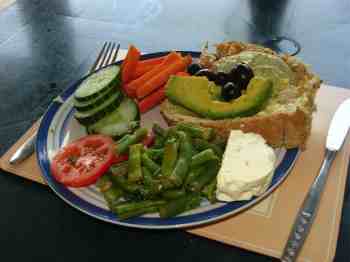
Whilst taste ranks high on our agenda, we strongly believe that society has been hoodwinked into believing that one need only eat that which we find delicious and pleasing. Many very important foods, like kale for example have little flavour but rank very highly in our green kitchen; finding ways to include them in our meals is important to us.
How to thicken our dishes is an issue at our green kitchen. We don't like ultra-refined cornstarch and all purpose flour; read more about this complex subject at our curried green beans page.
This kale and spinach sauce for example will light up a tasteless pasta or mashed-potato meal.
Another favourite is our kale pesto; having several friends with macular-degeneration I confess to being frankly terrified of it. I would rather eat greens several times a day than have doctors poking needles into my eyes.
Eschewing refined carbohydrate is also central to our cooking. You won't find any recipes here using white rice, cake flour and oodles of sugar. Raised blood glucose is the downfall of modern civilisation resulting in obesity, diabetes and cardiovascular conditions; the so-called chronic degenerative diseases.
Our understanding is that treating Brother Ass kindly is a sacred trust that we have been given. Abused with highly-processed food and a lack of exercise he has a way of turning around and biting us; or giving a painful kick on the shins.
For those being forced through circumstances to go without medical insurance, who wholeheartedly embrace wellness, it may be a profoundly beneficial step.
Just as those who have no cover for their automobile will drive more carefully, so you could find yourself choosing a lifestyle that will carry you through to a strong and alert eighty plus.
Remember that 80% of poor health is related to lifestyle; and only 20-percent to our genetic makeup.
Our green kitchen
Our green kitchen is about slow, nutritious food made fast. This is where the gut-lung connection and the coronavirus story begins.
Starches
Corn and beans provide a wonderful balance to the diet in many countries. But once those mealies have been refined, they are simply empty calories; a junk food of the highest order, not fit for human consumption.
A mealie a day provides some thoughts on why over a quarter of the children in South Africa are permanently stunted. An allied page, why were cornflakes invented will certainly stir the pot.
Baking your own bread need not be an irksome and time-consuming business. It takes me less than ten minutes every morning to produce the most delicious loaf in the world; but wait, dough has a mind of its own.
Sourdough deals with many of the issues that bedevil us today; there are huge doubts about starches, leaky-gut and gluten. Despite all of that there is strong research that whole grains are extremely good for us; but they are hard to get. So we have a mill for grinding corn and wheat; then you have 100% flour.
To my mind whether better taste or whole grain nutrition is your focus, baking the best bread in South Africa
is absolutely worth ten minutes of your time each day. Interestingly
there is evidence that those with a gluten intolerance can
enjoy the 100% sourdough loaf without a grumbling belly. I would also
recommend a probiotic such as kefir.
Part 2 of this series is introduced at ingredients for sourdough bread.
Pizza and commercial loaves in general bedevil many of our stomachs. In the UK they celebrate Sourdough September each year to remind us that real bread tastes so good; and doesn't give the bloating that we have come to associate with gluten and refined starch.
Of one thing I am certain; it's in the kitchen that our fates will be determined in both the chronic diseases and the acute conditions brought on by viruses and bacteria. That is where strong resistance to debilitating illness begins.
My journey with the threat of Covid-19 has reinforced the belief that we should be extremely vigilant about keeping our blood glucose under control; that means strongly limiting refined carbs and probably being vaccinated despite many Doubting Thomas'.
This disease has killed millions of people and continues to do so; in the main the obese and the unvaccinated.
This beer bread recipe is another of our favourites.
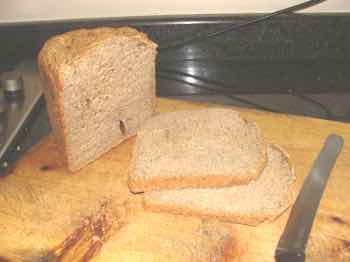
Safe and quick food preparation is dependent on the right tools; here are a few of my favourite kitchen utensils.
And my favourite kitchen appliances feature here too.
Oddly another favourite appliance is this old cardboard Wonder Box. Allowing whole grains and legumes to cook slowly overnight and then cool whilst retrogradation is occurring prevents rapid release of glucose in the gut. Already we know that excessive sugar fuels dementia and stroke; let's not add fuel to the flames.
New potatoes have half the starch of those from cold-storage but they need to be eaten, like all other vegetables within a couple days of harvesting. Since you don't need to peel them they are a rich source of fibre.
This potato gratin is quick to prepare; the fibre and cream keep the glycemic-index down. Provided you keep to small portions you need have no fear of the effect on your blood glucose.
A traditional Swiss rösti recipe is even easier to make, light and crispy, perfect for breakfast or light Sunday night supper. We only use new potatoes since I am prediabetic; now with an excellent HbA1c of 5.4 since giving up sugar and refined carbs for ever. Taking a stroll after supper has also made a big input.
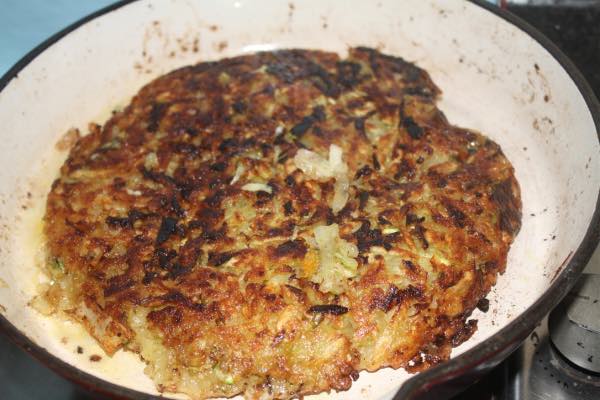
Legumes
We all need to learn how to cook legumes; they are a much cheaper form of protein than meat, give off far less greenhouse gases than cattle and require a tenth of the water. Within a few short decades beans, peas and pulses like lentils will be the norm for everyone.
Broad beans on toast
is a wonderful nutritious dish that can be made in only fifteen
minutes; but it is easy to ruin if you insist on popping the seeds out of their skins. You lose much of the important phytochemicals like L-dopa and the glycemic index shoots up due to the loss of fibre; higher than sugar.
Freezing broad beans means you could enjoy them all year round; especially important for those with a tremor. It's all about the dopamine. Sprouting them is another excellent option.
Whole foods are chewy but we pay a terrible price if we avoid them. Along with a probiotic like kefir they pave the way to the happy tum; and a five times better response to chemotherapy should you get a malignant tumour[2].
Homemade hummus with lemon pulp is a legume we enjoy almost every day; it takes only five minutes to prepare once you are in the routine. It has all the essential amino acids making it an especially good protein for vegans.
Is it easy to make a hummus salad dressing recipe? It certainly is.
Use the lemon pulp too; more than half of the nutrients and flavour are lost if you squeeze out the juice.
In short enjoy whole foods; a huge step-up to greater wellness.
And then of course there's making humus; that is something quite different.
Alcohol
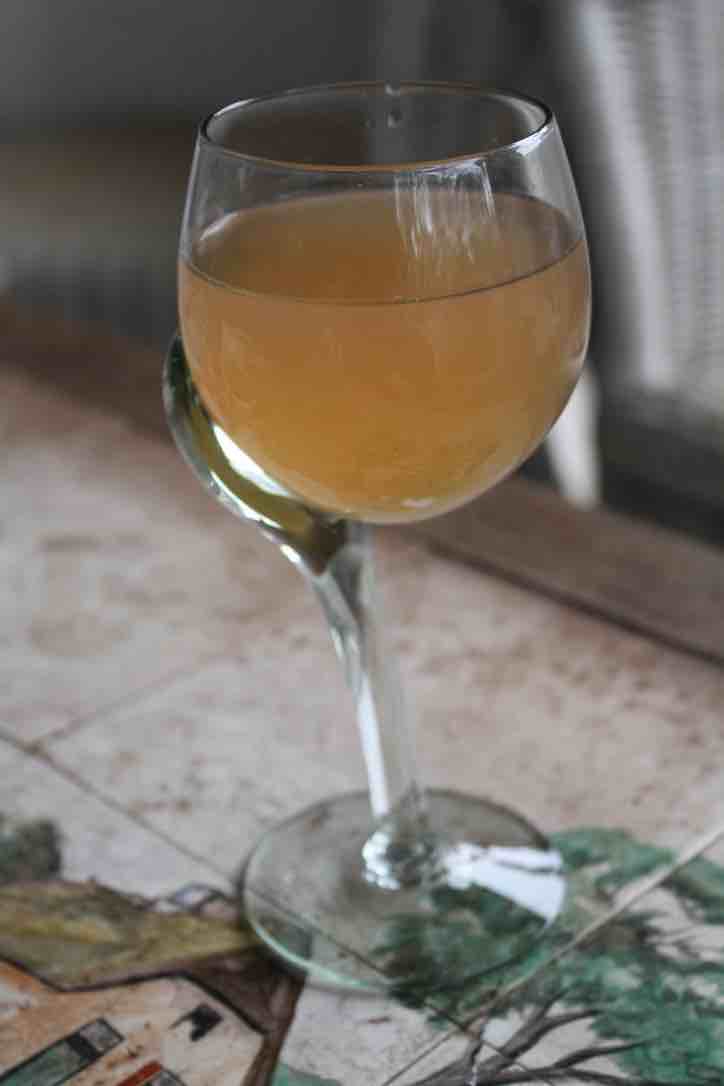
Brewing various tipples has been a hobby of mine for at least thirty years; first it was mead, then a braggart and more recently I learned to make Merrylegs perry cider. It is so simple.
How is apple cider made is another question I once asked; and found that it was deliciously simple.
An all-hive mead uses just the gleanings left after decapping the honeycombs, water and yeast.
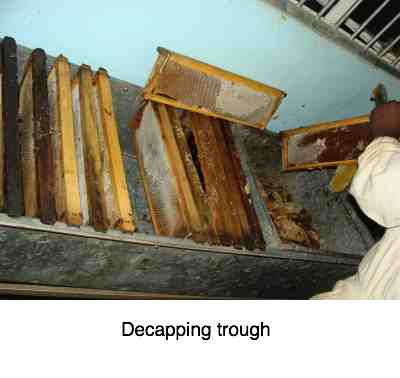
Coloured foods
There is huge emphasis in the literature on getting many different coloured foods onto the plate from your own green kitchen; that means reds, purples and yellows too. They contain the phytochemicals that help prevent chronic inflammation and the development of nasty tumours.
We found initially that tomatoes in our garden were very tart and had an almost metallic taste. Until we learned how to caramelize our vegetables; they also gave me painful gout attacks.
Caramelizing our tomatoes means we no long have this problem; cookery is an art and you slowly pick up tips by listening to those who immerse their lives in it.
This poached eggs on fried sourdough bread chunks recipe creates a wonderful breakfast.
We strongly advocate the KISS principle; keep your cooking simple, wholesome and nutritious. I have no desire to spend long hours in the kitchen producing food that leaves much to be desired.
- Keep your spinach lasagna simple; the pasta has no refined flour and takes less than an hour from start to finish. Instead it uses thin slices of wholesome sourdough bread.
- This sweet basil pesto recipe is so simple to make in your green kitchen.
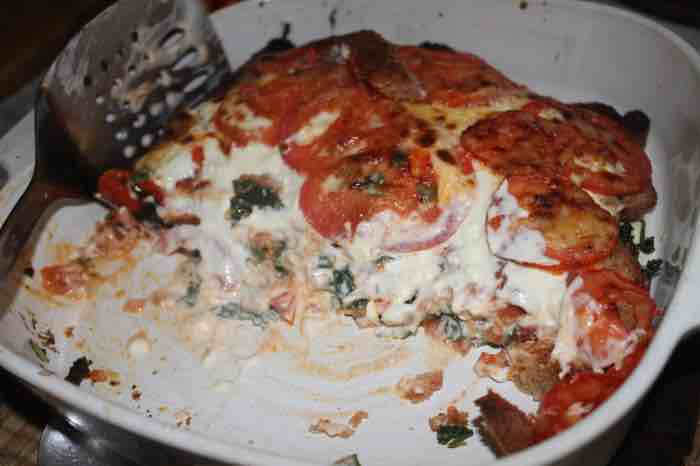 A simple spinach lasagna using wholegrain bread.
A simple spinach lasagna using wholegrain bread.Probiotics
Homemade probiotics support the community of friendly bugs that live in the alimentary canal. One of the favourites from our green kitchen is made from susus, a staple food that keeps us going for months.
Organic kitchen waste
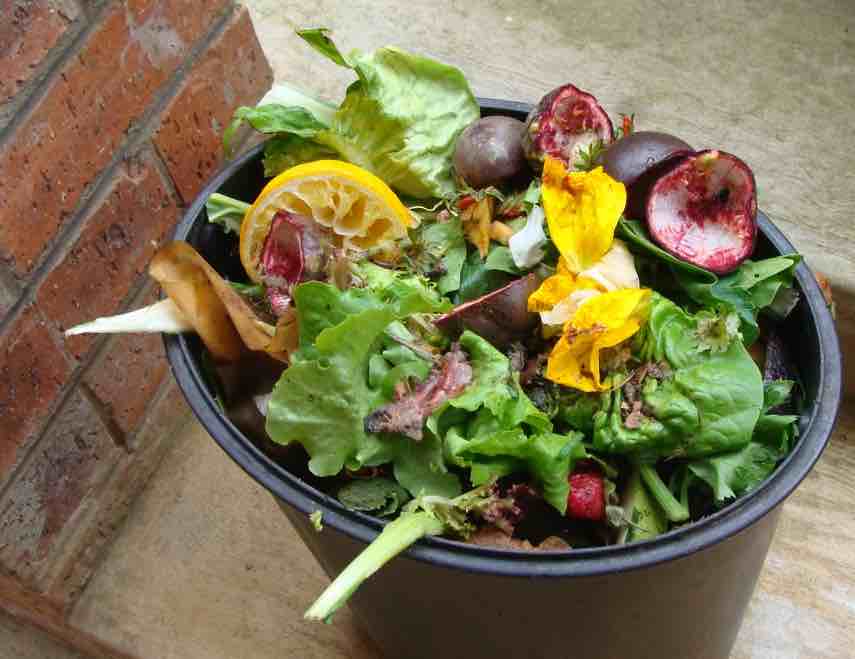 The compost bin is an essential for organic gardeners
The compost bin is an essential for organic gardenersThe material expressed on this page is gleaned from the nutritional and environmental literature; it is clearly referenced. A plain distinction is made between the author's opinion and that which is scientifically proven. When in doubt consult your health professional.
To suggest a correction or clarification, write to Dr Bernard Preston here. Contact.
Your organic kitchen waste is a rich source of nutrients. For heaven's sake do not send it out to the trash. First in the hierarchy make sure your dogs get the best of the meaty bones and other scraps.
Compost bins are essential; they must be emptied and washed at least twice a week. Ours goes to the worm farms but there are the chickens that will thrive on that old lettuce, rice and bread.
Never forget the thiamine story; the first vitamin discovered. Many millions of people have died from eating polished rice; at Our Green Kitchen we never touch it. A deficiency causes a serious neurological disease.
Worm farms and the black plague reminds us of the devastation that can befall communities that do not deal adequately with their green kitchen waste.
Foods that are not processed
In short finding foods that are not processed is time-consuming and certainly not effortless. We justify it because of the wonderful taste of whole grains and fresh vegetables; and since they are cheaper and more nutritious. In our mid seventies both Helen and I enjoy a life without medication.
"It has been estimated that 20% of Medicare beneficiaries have five or more chronic conditions; and fifty percent are taking 5 plus drugs."
The so-called industrialised diet has come about because of the greed of large companies to make a lot of money out of us; and secondly the demand by exhausted consumers for convenience foods.
This creamed midsummer zucchini squash soup recipe is a great favourite; and so quick to put together.
We say, "make the time, or you'll be spending a lot more consulting doctors and pharmacists." And in any case foods that are not processed are far more tasty.
This passionfruit posset is another great favourite but without the sugar.
The war against breast cancer
The war against breast cancer is to be won in your own green kitchen, not in the oncologist's rooms. It's to be found in that word prevention, rarely mentioned in relation to healthy any longer.
Can you imagine that just one helping of a whole grain daily reduces the prevalence of breast cancer by nearly 50%? Add to that more omega-3 oils, half an hour in the sunshine every day and foods high in magnesium. Enjoy olives and avocados; and a helping of green beans.
If we did all of the above, breast cancer would be rare; simple stuff. Instead it's the leading killer of women.
When browsing use right click and "Open Link in New Tab" or you may get a bad gateway signal.
Newsletter
Our newsletter is entitled "create a cyan zone" at your home, preserving both yourself and Mother Earth for future generations; and the family too, of course. We promise not to spam you with daily emails promoting various products. You may get an occasional nudge to buy one of my books.
Here are the back issues.
- Lifestyle and ideal body weight
- What are ultra-processed foods?
- Investing in long-term health
- Diseases from plastic exposure
- Intensive lifestyle management for obesity has limited value
- A world largely devoid of Parkinson's Disease
- The impact of friendly bacteria in the tum on the prevention of cancer
- There's a hole in the bucket
- Everyone is talking about weight loss drugs
- Pull the sweet tooth
- If you suffer from heartburn plant a susu
- Refined maize meal and stunting
- Should agriculture and industry get priority for water and electricity?
- Nature is calling
- Mill your own flour
- Bake your own sourdough bread
- Microplastics from our water
- Alternative types of water storage
- Wear your clothes out
- Comfort foods
- Create a bee-friendly environment
- Go to bed slightly hungry
- Keep bees
- Blue zone folk are religious
- Reduce plastic waste
- Family is important
- What can go in compost?
- Grow broad beans for longevity
- Harvest and store sunshine
- Blue zone exercise
- Harvest and store your rainwater
- Create a cyan zone at your home
Did you find this page interesting? How about forwarding it to a friendly book or food junkie? Better still, a social media tick would help.
- Homepage
- Our green kitchen
Address:
56 Groenekloof Rd,
Hilton, KZN
South Africa
Website:
https://www.bernard-preston.com